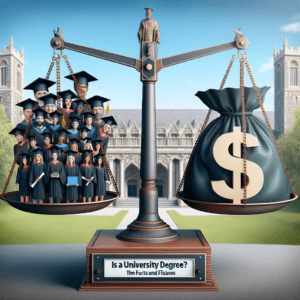In today’s fast-paced and ever-evolving job market, many individuals are left questioning whether investing in a university degree is still worth it. With the rising costs of tuition and the increasing popularity of alternative education options such as online courses and vocational training programs, the value of a traditional university degree is being scrutinized more than ever before.
However, despite the skepticism surrounding the necessity of a university degree, the facts and figures still overwhelmingly support its worth. According to the U.S. Bureau of Labor Statistics, individuals with a bachelor’s degree earn significantly higher salaries on average compared to those with only a high school diploma. In fact, the median weekly earnings for college graduates in 2019 were $1,248, while high school graduates earned $746 per week.
Furthermore, the unemployment rate for individuals with a bachelor’s degree is consistently lower than those with only a high school education. According to the Department of Labor, the unemployment rate for college graduates in 2019 was just 2.2%, compared to 3.7% for high school graduates.
Additionally, a university degree opens up a wide range of opportunities for career advancement and professional growth. Many high-paying and prestigious positions require a minimum of a bachelor’s degree, and individuals with advanced degrees such as a master’s or doctorate often have even greater earning potential.
Moreover, a university education provides individuals with valuable skills and knowledge that are highly sought after by employers. Critical thinking, problem-solving, communication, and analytical abilities are just a few of the key skills that are developed through a university education and are highly transferable to a wide range of industries and professions.
While it is true that alternative education options such as online courses and vocational training programs can offer cost-effective and specialized education, they may not always provide the same level of credentials, prestige, and opportunities as a traditional university degree. Employers often value a university degree as a signal of a candidate’s dedication, commitment, and ability to successfully complete a rigorous academic program.
In conclusion, despite the rising costs and growing alternatives in the education landscape, a university degree is still a valuable investment in one’s future. The facts and figures overwhelmingly show that individuals with a university education have higher earning potential, lower unemployment rates, and greater opportunities for career advancement. While it is important to carefully consider the costs and benefits of pursuing a university degree, the evidence supports the continued value and importance of higher education in today’s competitive job market.







